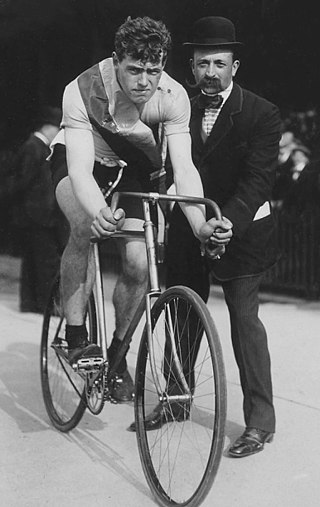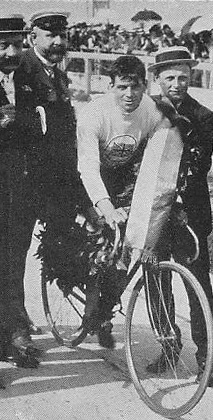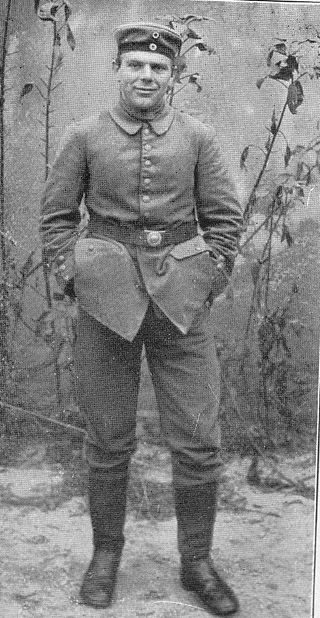Related Research Articles

The 1908 Summer Olympics were an international multi-sport event held in London, England, from 27 April to 31 October 1908. The 1908 Games were originally scheduled to be held in Rome, but were relocated on financial grounds following the violent eruption of Mount Vesuvius in 1906, which claimed over 100 lives; Rome eventually hosted the Games in 1960.

Joseph Edmund Deakin was a British athlete who competed at the 1908 Summer Olympics in London.

Cycling has been contested at every Summer Olympic Games since the birth of the modern Olympic movement at the 1896 Summer Olympics, at which a road race and five track events were held. Mountain bike racing entered the Olympic programme at the Atlanta Olympics, followed by BMX racing in 2008 and freestyle BMX in 2020. Before the 2020 Summer Olympics, all events were speed races, but the 2020 programme featured BMX freestyle for the first time.

The United Kingdom has been represented at every modern Olympic Games. By end of the 2024 Summer Olympics, it is third in the all-time Summer Olympic medal table by overall number of medals, and fourth in number of gold medals won. London hosted the Summer Olympic Games in 1908, 1948 and 2012.

The men's 1000 metre sprint was one of seven track cycling events on the Cycling at the 1908 Summer Olympics programme. Its distance was the second shortest of the individual event distances. Each nation could enter up to 12 cyclists.
Ernest Payne was an English track cycling racer. Born in Worcester, he won a gold medal in the team pursuit at the 1908 Summer Olympics in London for Great Britain and went on to play football, including two games as an amateur for Manchester United.

Leonard "Leon" Lewis Meredith was a British track and road racing cyclist who competed in the 1908 Summer Olympics, in the 1912 Summer Olympics, and in the 1920 Summer Olympics. He won seven world championships, set up one of Britain's largest cycle-parts companies, and ran a roller skating rink and ballroom.

The men's sprint event was part of the track cycling programme at the 1920 Summer Olympics. There were 37 competitors from 11 nations, with each nation apparently limited to four cyclists. The event was won by Maurice Peeters of the Netherlands, the nation's first victory in the men's sprint. Two British cyclists, Thomas Johnson and Harry Ryan, were in the final as well, taking silver and bronze.

Victor Louis Johnson, Vic Johnson, was a British track cycling racer who, in 1908, won a gold medal at the 1908 Summer Olympics; became 'World Amateur Sprint Champion' and the 'British National Quarter-mile Champion'.

Benjamin Jones was a British track cycling racer who competed in the 1908 Summer Olympics.

Clarence Brickwood Kingsbury was a British track cyclist who competed in the 1908 Summer Olympics. He belonged to the Paddington and North End cycling clubs.
Johannes "Juho" Jaakonaho was a Finnish road racing cyclist who competed in the 1912 Summer Olympics.
Jay Nash McCrea was an American cyclist and newspaper editor. Nicknamed "Crash" for his "dangerous" and "wild" riding style, he competed in the men's one mile and men's five mile events at the 1904 Summer Olympics, but did not finish either event.

Dorotheus Magdalenus "Dorus" Nijland was a Dutch track and road racing cyclist. Nijland was a sprinter. He was an amateur cyclist and later Nijland became a professional cyclist (1913–1915) and continued cycling as a master. His total career was between 1905 and 1935. He won over a hundred prizes, and competed at the 1908 Summer Olympics.

William James Bailey was a British cyclist. He competed in three track sprint events at the 1908 Summer Olympics, but failed to reach the finals.
Ralph Jack Richard Mecredy was an Irish cyclist who competed for Great Britain in two events at the 1912 Summer Olympics. He was the son of Irish champion cyclist Richard J. Mecredy.
Raymond Hicks was a British cyclist. He competed in the sprint and 1km track time trial events at the 1936 Summer Olympics.
Lorne Atkinson was a Canadian cyclist. He competed in four events at the 1948 Summer Olympics. Nicknamed "Ace", Atkinson spent his life involved in cycling in the Vancouver area.
Billy Kerr was an Irish cyclist. He competed in the individual road race event at the 1980 Summer Olympics.

Franz Paul Nettelbeck was a German sportsman who excelled as a long-distance runner and cyclist. He competed in the men's 5 mile run at the 1908 Summer Olympics.
References
- ↑ Joe Lavery at Olympedia (archive)
- ↑ "Joe Lavery Olympic Results". sports-reference.com. Archived from the original on 7 February 2013. Retrieved 3 May 2013.